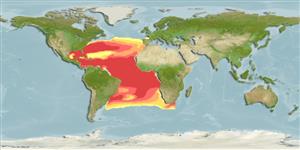>
Beloniformes (Needle fishes) >
Exocoetidae (Flyingfishes)
Etymology: Hirundichthys: latin, hirundo = swift; 1300 + Greek, ichthys = fish (Ref. 45335).
Environment: milieu / climate zone / depth range / distribution range
Ecologia
marinhas; intervalo de profundidade 0 - ? m. Subtropical
Atlantic Ocean. NW Atlantic (Massachussetts south along the US) Bermuda, the Bahamas ad throughout the Gulf of Mexico and the Caribbean Sea. East of 30° W are extremely rare and could possibly represent strays of H. rondeletti. Confirmed to occur in Portugal, the Azores and Canary Islands.
Tamanho / Peso / Idade
Maturity: Lm ? range ? - ? cm
Max length : 24.0 cm SL macho/indeterminado; (Ref. 109257)
Descrição suscinta
Morfologia | Morfometria
Raios dorsais (total): 10-13; Raios anais : 10 - 13; Vértebras: 44 - 47. This species is distinguished by the following characters: elongated body nearly rectangular in cross-section, almost flat ventrally; its depth 5.2-6.4 times in standard length (SL): vertebrae 44-47; predorsal scales 25-31; scales in transverse row 6.5 to 8.5, usually 7.5; head 4.2-5.2 times in SL;
eye 3.1-3.3 times in head; jaws subequal, the teeth conspicuous, conical; no palatine teeth; gill rakers on first arch 24-29; low dorsal fin with 10-13 rays; anal fin with 10-13 rays, originating
slightly before, or 1 to 2 rays behind dorsal-fin origin; pectoral fins 1.2-1.4 times in SL, with 16-19 rays and the first two rays unbranched; pelvic fins 2.5-3.4 times in SL, inserted slightly nearer to posterior margin of opercle than origin of caudal-fin base; juveniles are not barbelled; colour of body dark above, pale below, the dorsal and caudal fins greyish and anal fin transparent; pectoral fins black without unpigmented cross-band and with a narrow light outer margin; pelvic fins usually with black spot. Juveniles less than 5,0 cm SL have a few dark transverse vertical bands on body; dorsal, pectoral and pelvic fins mottled with dark spots and bands (Ref. 109257)..
Feeds on zooplankton. Eggs demersal. No importance to fisheries (Ref. 109257)..
Ciclo de vida ou comportamento de acasalamento
Maturidade | Reprodução | Desova | Ovos | Fecundidade | Larvas
Carpenter, K.E. and N. De Angelis (eds.), 2016. The living marine resources of the Eastern Central Atlantic. Vol. 3: Bony fishes part 1 (Elopiformes to Scorpaeniformes). FAO Species Identification Guide for Fishery Purposes, Rome, FAO. pp. 1511-2350. (Ref. 109257)
Status na Lista Vermelha da UICN (Ref. 130435)
Ameaça para os humanos
Harmless
Uso pelos humanos
Pescarias: sem interesse
Mais informação
Nomes comunsSinônimosMetabolismoPredadoresEcotoxicologiaReproduçãoMaturidadeDesovaAgregação de desovaFecundidadeOvosDesenvolvimento dos ovos
Idade/TamanhoCrescimentoPeso-comprimentoComprimento-comprimentoFrequências de comprimentoMorfometriaMorfologiaLarvasDinâmica larvalRecrutamentoAbundânciaBRUVS
ReferênciasAquaculturaPerfil para aquaculturaEstirpesGenéticaElectrophoresesHereditariedadeDoençasProcessamentoNutrientsConversão de massa
ColaboradoresFotosStamps, Coins Misc.SonsCiguateraVelocidadeTipo de nataçãoÁrea branquialOtólitosCérebrosVisão
Ferramentas
Relatórios especiais
Baixar XML
Fontes da internet
Estimates based on models
Índice de diversidade filogenética (Ref.
82804): PD
50 = 0.5002 [Uniqueness, from 0.5 = low to 2.0 = high].
Bayesian length-weight: a=0.00646 (0.00292 - 0.01429), b=3.04 (2.84 - 3.24), in cm total length, based on LWR estimates for this (Sub)family-body shape (Ref.
93245).
Nível Trófico (Ref.
69278): 3.0 ±0.1 se; based on size and trophs of closest relatives
Resiliência (Ref.
120179): Elevada, tempo mínimo de duplicação da população menor que 15 meses (Preliminary K or Fecundity.).
Fishing Vulnerability (Ref.
59153): Low vulnerability (19 of 100).
